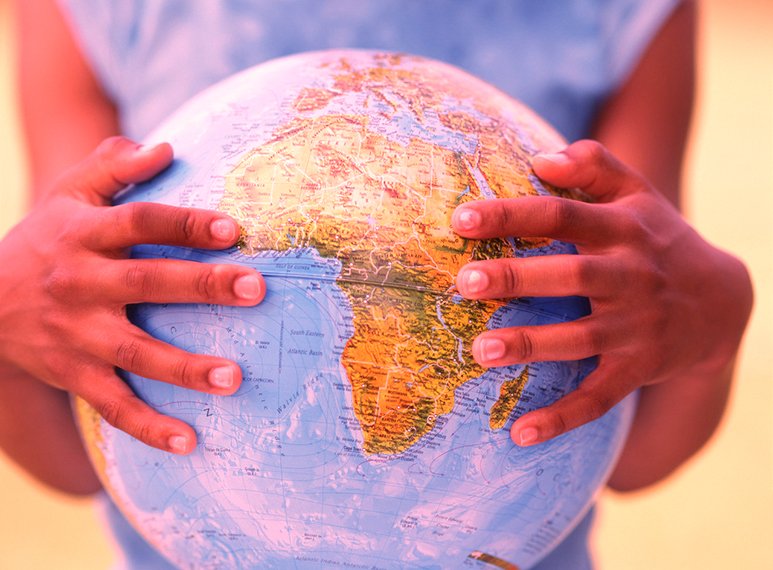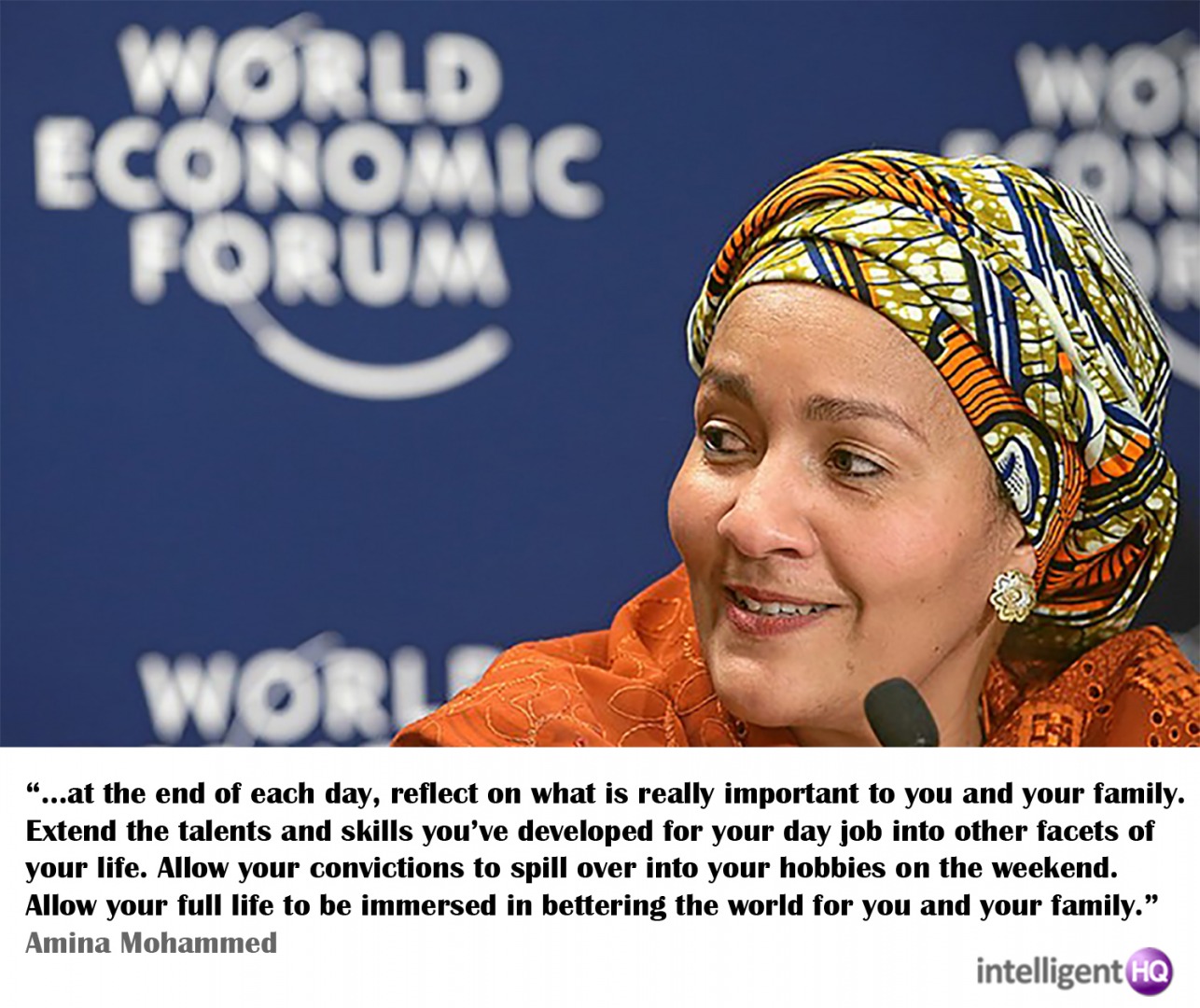
A Conversation with Ms. Amina Mohammed, UN Special Advisor of the Secretary-General on Post-2015 Development Planning – Part 2
Ms. Mohammed further stated, “…The past 15-years of implementing MDGs taught us a lot. We are using the post-2015 development process to take a harder look at root causes and to put a new framework of accountability in place. This journey has shown the enormity of the global challenge. Our effort is universal, and we intend to leave no one behind. Our intent is to extend our initiatives beyond experimentation and pilot phases. We are motivated and mobilized to take our resources to scale.”
Like the MDGs, the SDGs of the post-2015 agenda are being driven by a multifaceted stakeholder-driven consensus building process. By the end of July the UN will have the framework for the post-2015 agenda established. Currently, member states have defined 17 SDGs and 169 targets, a substantial number, yet understandable considering the breadth of global challenges the SDGs will work to contend with.
The state of the world has changed dramatically since the year 2000 Millennium Summit of the UN and adoption of the UN Millennium Declaration. In particular, the speed of information, rate of change, and awareness of the global human and ecological condition and context has accelerated. The advancement, deployment, and utilization of technology in the past 15-years have been tremendous. It has been estimated that there will be more than 5 billion mobile phone users (of which 2 billion will be smart phone users) globally by 2017. This is but one of several indicators that we are a more connected and accessible generation than any time in history. Yet the rate of technology adoption does not appear, necessarily, to correlate to a rate of change in public perception and action on many global and generational sustainability issues.
Ms. Mohammed agreed. She noted that another key difference in the post-2015 process and agenda will be a deliberate focus on retooling the service delivery infrastructure of the SDGs. Ms. Mohammed remarked, “…education has been and remains an essential building block of service delivery, but we need to right size and align the delivery of education with the needs of the member states and global market. The hardware, software, and entire infrastructure surrounding the delivery of SDG program initiatives, such as education, are being engineered to have definitive purpose and impact. In this era of the Digital Age it may be easier to mobilize people, however the utility of our tools have to extend beyond initiating human will and presence. It must also transcend generational perspective, religious and political ideologies, economic disparities and so on. Take for example the impact digital communications had on the Arab Spring movement. The speed of information was instrumental in mobilizing people; however no one was ready for the day after the Arab Spring. We have to find ways to communicate with one another and get past the rhetoric. We need to leverage technology, tools, and information in ways that enable long-term capacity building.”
The fate of humanity and that of the earth are one in the same. Ultimately it’s everyone’s responsibility to take an active role in their personal fate and freedom. We are the stewards of our own individual life and destiny, although for some, this form of personal freedom is often constrained by limiting factors related to health, security, conflict, education, economics and other factors. But regardless of one’s life context, the choices we make on a daily basis impact not only us, but the lives of others.

Our lifestyles, convictions, and behaviors have an immediate impact here and now, but also on the fate and freedom of future generations. There are differences in the way older and younger generations live, think, and act. Those that lived through the 1940s, 50s, 60s, and 70s have a completely different worldview than the Millennial Generation born in the 1980s. The social, economic, and environmental issues and events of the last Century cast a long shadow, yet the younger generation represents a ray of light and hope for continued change.
The generation occupying earth today has greater awareness of global challenges and our capability to address those challenges in a sustained manner. We now have greater knowledge and understanding about the impact humans have on each other and the state of the world. The interconnectedness between humanity and our economy, environment, quality of life, health, security, spirituality, and overall well-being is becoming more transparent.
While science, economics, and politics provide the facts, data, funding, and influence – a building block of sustainable development remains undervalued and underutilized. That element is the moral obligation, character, integrity, and will of individuals to take a stance on right vs. wrong, and because values and beliefs can be (if we choose them to be), as powerful as science, data, money, and political influence.
In recent weeks Pope Francis has reinvigorated the hidden truth, that if we choose to accept the responsibility of, and act upon our moral obligation to better the world, we can take down the wall of worldly challenges, like climate change, which may seem insurmountable. Truly, the power of individual personal accountability is the single greatest potential we have for sustainable development.
Ms. Mohammed concurred with the notion that by taking action and responsibility for our behaviors, and by having the personal will to see change through, one person can truly make a difference in the world. She stated, “…there is a large fear of the unknown among civil society, the business community, and governments. The post-2015 agenda is huge, but we will be working to communicate it with clarity, so that it does not overwhelm, and so that we can transition the SDGs beyond the MDGs in a way that allows people to get their arms around their individual and our collective roles. We are working to fit the agenda with a strong sense of purpose.”
Ms. Mohammed concluded our call with a piece of wisdom. On the subject of how civil society – and every day citizens – can become engaged in sustainable development and support the post-2015 agenda she added, “…at the end of each day, reflect on what is really important to you and your family. Extend the talents and skills you’ve developed for your day job into other facets of your life. Allow your convictions to spill over into your hobbies on the weekend. Allow your full life to be immersed in bettering the world for you and your family.”
Communicate with clarity and leave no one behind: Scaling Sustainability in a Post-2015 World – Part 1
Mark Coleman is a recognized voice, business advisor and consultant on the convergence of sustainability, environmental stewardship, energy, technology, and innovation.
Mr. Coleman is an active blogger with the Huffington Post, and has published numerous articles with leading organizations including GreenBiz.com, Environmental Leader, Triple Bottom Line Magazine, among others.
Mr. Coleman is the President of Convergence, Mitigation, Management (CMM) LLC, which provides custom business intelligence and advisory services for business, government, applied research, not-for-profit, and non-governmental organizations.
Mr. Coleman has advised hundreds of organizations in the areas of sustainability, risk, innovation, operational effectiveness, and business strategy. Much of this work led Mr. Coleman to write and publish two books, Time To Trust: Mobilizing Humanity for a Sustainable Future (Motivational Press 2014, www.timetotrustbook.com) and The Sustainability Generation: The Politics of Change and Why Personal Accountability is Essential NOW! (SelectBooks 2012, www.thesustainabilitygeneration.com) both of which highlight his perspective on holistic systems-level logic and theory for advancing humanity beyond the status-quo toward more integrated and mutual models of sustainable development.
Mr. Coleman currently serves on the board of the Sustainable Manufacturer Network (http://sustainablemfr.com/), and on the board of a not-for-profit organization, B9 Plastics (www.b9plastics.org) involving global water development concerns.
Mr. Coleman resides in the Finger Lakes region of New York with his wife Aileen and two sons, Owen and Neal.
Web:
Website: www.timetotrustbook.com
Twitter: @TheSustainGen











